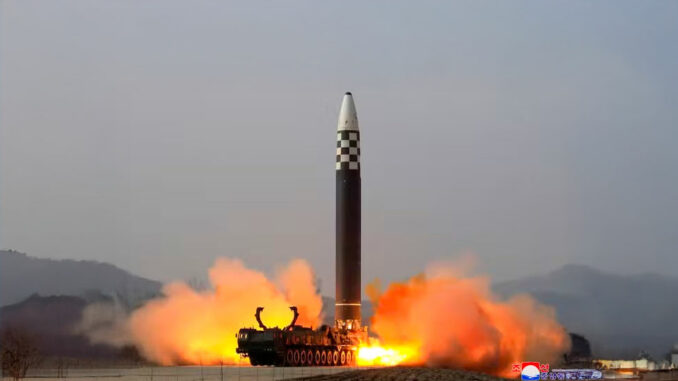
North Korea supplies ballistic missiles to Russia, which in exchange transfers advanced defense technologies to it, altering the global strategic balance.
Since 2023, North Korea has stepped up its arms deliveries to Russia, shipping thousands of containers of shells and ballistic missiles. In return, Moscow provides Pyongyang with sophisticated air defense systems and technological support, particularly in the nuclear and space fields. This military cooperation strengthens Russia’s offensive capabilities in Ukraine and accelerates the modernization of North Korea’s arsenal. It represents a violation of UN resolutions and raises serious concerns about regional and global stability.
North Korea, a major supplier of arms to Russia
Since the beginning of the conflict in Ukraine, Russia has faced massive consumption of ammunition. To meet its needs, it has turned to North Korea, which has shipped between 10,000 and 12,000 containers of weapons, including 122 mm and 152 mm shells, compatible with the Soviet systems still used by the Russian army. These deliveries also include short-range ballistic missiles, such as the KN-23 and KN-02, capable of hitting targets at a distance of 120 to 140 kilometers with increased accuracy thanks to inertial guidance and an optical correlation system.
The use of these missiles by Russia has been confirmed by analyses of debris found in Ukraine, particularly in Kharkiv, indicating a violation of the arms embargo imposed on North Korea. This situation highlights Moscow’s growing dependence on Pyongyang to maintain its war effort, despite international sanctions.

In exchange, Russia transfers advanced military technologies to North Korea
In return for these arms deliveries, Russia provides North Korea with sophisticated air defense systems, such as surface-to-air missiles, thus strengthening Pyongyang’s defensive capabilities. In addition, Moscow offers technological support in sensitive areas, including the development of spy satellites and submarines, as well as assistance in circumventing international sanctions. These technology transfers enable North Korea to accelerate the modernization of its military arsenal and strengthen its strategic position in East Asia.
This close military cooperation was formalized by the signing, in June 2024, of a comprehensive strategic partnership agreement between the two countries, providing for mutual assistance in the event of aggression and collaboration in the political, commercial, investment and security fields. This agreement marks a turning point in bilateral relations and is a direct response to Western alliances perceived as hostile by Moscow and Pyongyang.
An alliance that upsets the global geostrategic balance
The intensification of military cooperation between Russia and North Korea has major repercussions on the global geostrategic balance. It calls into question the effectiveness of international sanctions and weakens the non-proliferation regime. Moreover, it strengthens Russia’s offensive capabilities in Ukraine and provides North Korea with the technological means to develop its nuclear and ballistic program.
This alliance is causing serious concern among Western countries and their allies in Asia, particularly South Korea and Japan, who fear an escalation of tensions in the region. It also highlights the formation of a strategic bloc opposed to Western influence, bringing together Russia, North Korea, Iran and, to a certain extent, China, which is increasing its trade with Moscow.
Consequences for regional and international security
Military cooperation between Russia and North Korea has direct implications for regional security in East Asia and for international stability. It could encourage other countries to strengthen their military capabilities, triggering an arms race in the region. It also complicates diplomatic efforts aimed at the denuclearization of the Korean peninsula and the peaceful resolution of the conflict in Ukraine.
Faced with this situation, Western countries must reevaluate their security strategies and strengthen their cooperation to deal with this emerging military alliance. It is crucial to maintain diplomatic and economic pressure on Russia and North Korea, while exploring avenues for dialogue to avoid an uncontrolled escalation of tensions.
Future prospects and challenges
The military alliance between Russia and North Korea represents a major challenge to the established international order. It illustrates the ability of certain States to circumvent sanctions and to establish strategic partnerships outside traditional multilateral frameworks. This situation requires a coordinated response from the international community to preserve global stability and prevent the proliferation of weapons.
In the long term, it is essential to strengthen arms control mechanisms and promote inclusive diplomatic initiatives to defuse tensions and foster international cooperation. Monitoring arms transfers and transparency in bilateral military relations must be priorities to prevent future crises.
War Wings Daily is an independant magazine.